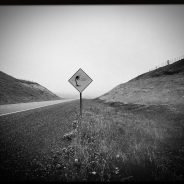
Uso de cookies
Este sitio web utiliza cookies para que usted tenga la mejor experiencia de usuario.
Si continúa navegando está dando su consentimiento para la aceptación de las mencionadas cookies y la aceptación de nuestra política de cookies.


29 May, 2020
The wind brought wealth to Troy. The phrase is written on a plaque at the entrance to the ruins where it was supposedly erected. Today it is known as the Hisarlik hill, in Turkey.
I always think of that sentence, and the relative meaning of it, whenever there is wind. However, often times wind will not bring wealth, but destruction and death when it comes in its more aggressive forms like hurricanes and tornados. There are theories that suggest that wind can also provoke mental illness, depression, headaches or suicides in places where this happens.
By the summer of 2018, I had faced many winds during the journey. Riding through the famous route 40 in Argentina toward Ushuaia, on Athena looking like a kite. We swing side to side on the road while we try to keep a straight line. We’re leaning as if taking a turn, fighting the Pampero wind with its 50km/h strength attacking us from the side.
Since I am not Troy, I bear the brunt. My back is tense. I need to stop every now and then to rest my arms. The trucks that pass me by make matters worse. The cutting of the wind as they pass makes the return of the gusts worse. There are a couple of scares when the bike gets pushed on the shoulder of the road and let’s not talk about the time I’m riding over gravel. The dust clouds generated by the wind blinds you momentarily as you ride over slippery ground.
Every civilization that had polytheism had a wind deity or god. The effects, good and bad, we see them daily. They flip skirts up. It ruins hairstyles after going to the hair dressers. It throws plant pots from balconies. It throws sand on our eyes at the beach and makes recently hanged sheets fly off. Someone soaks themselves in the rain because the wind flipped their umbrella inside out. In many places, the fences on the side of the road are covered with plastics bags that came from landfill. Wind also erodes, changes topographies. It pollinates and generates electricity.
In horror films, wind is a main character. It sieves through the cracks of old houses, smashing doors and windows. It moves curtains. A cat escapes running. The rusty weather vane spins. It injects fear in us, generating unrest, shock, overwhelming us. The air, prime material of wind, gets into our bodies as we breathe in, only to come out in the form of a scream when we get scared.
To tell the truth – while on the bike and with such strong winds – I feel as vulnerable as ice being placed over fire. I enjoy the emotion of frailty. I continue. I go through the Argentinian Patagonia. I think of Ulysses, who upon his return is given a bag by Aeolus, inside of which there were all the winds except the one that would take him home. The greed of some seamen opened the bag and freed the winds. Ulysses, then had to continue facing adversaries. I, too, have adversaries while travelling on the bike. Some real, some imaginary.
So I tell myself: be like Ulysses. Trust Athena and flow with the wind.
Where I grew up in southern Alberta, Canada, there is a wind called a ‘chinook’ (snow eater) that happens when cold, damp air coming over the Rocky Mountains warms up and dries out as it descends. It drastically changes the weather: the record is temperature going from -19C to +22C in just one hour. Some studies link chinooks to physical and mental health, but relatively few people are severely affected.